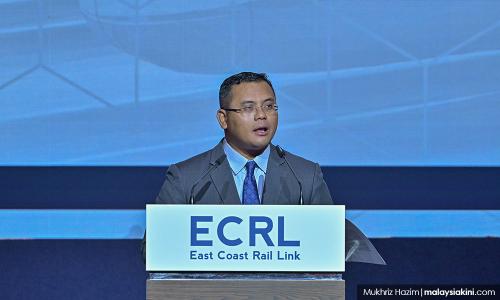LETTER | ECRL possible gamechanger for Batang Kali’s economy?
LETTER | Recently, I came across several news reports of Selangor Menteri Besar Amirudin Shari touting the sleepy town of Batang Kali as a potential railway transport and logistics hub in the wake of the East Coast Rail Link (ECRL) development.
Let me first preface my thoughts by stating that I was born and bred in Batang Kali and it is where I chose to settle down with my wife and three children.
This is not the first time Batang Kali has been touted as the next big economic frontier in Selangor. Previously, it was its lush greenery and abundant wildlife which was said to position this town as an eco-paradise in line with the eco-tourism boom in the state.
We all know how that ended, the pandemic nearly decimated the local tourism industry.
However, the new talk of this small town is what the ECRL could bring to us. Having spent the past two years in stints of quarantines and lockdowns, I think we all have learnt the invaluable lesson that if you do not change to fit the environment, you will fail to prosper.
In the immortal words of author John C Maxwell, change is inevitable, growth is optional.
Having said that, I welcome the ECRL as a much-needed development to uplift and improve the local economy and the quality of life here in Batang Kali.
I was lucky to secure a role in the civil service here which has afforded me a moderate lifestyle and a pension – enough to keep my wife and myself going without any additional aid. However, the same cannot be said about others who have had to suffer tremendous losses due to the pandemic.
Almost daily one can hear stories of once zestful entrepreneurs who took out loans to run homestays and eco-tourism businesses now struggling to eke out a living as the local tourism industry has yet to recover.
Besides that, there isn’t anything much in this simple town to retain the population. My children – all of whom have graduated – have decided to find their fortunes in bigger cities like Kuala Lumpur and Penang. No one wants to stay back – admittedly, for all the right reasons as there just aren’t any good opportunities here.
As a result, you have an ageing population and a sluggish local economy. If the ECRL can offer a solution to this conundrum, I do not see why we should not welcome it with open arms. There is massive potential in shipping as its construction via the northern line has made the process of shipping containers to and from Port Klang easier, without the hassle of going through Kuala Lumpur.
I am, nevertheless, cautious about development of any kind.
We only need to look at recent events such as flash floods and landslides as well as changes in weather patterns to see the manmade impact of economic development. I would certainly not want this pristine town to lose its natural charms just for the sake of development.
I believe that given the lessons learnt from these past few years, we are able to better chart our economic progress in a way that balances growth and the environment. The ECRL’s environmental impact assessment (EIA) is reportedly able to mitigate and minimise damage to the environment, so that is good to hear.
It is foolish to think that any development can come without environmental costs. But what is at stake here is also the lives and livelihood of regular Malaysians. Striking a balance between the two is vital for us to come out of the economic impact of the pandemic.
RM12.50 / month
- Unlimited access to award-winning journalism
- Comment and share your opinions on all our articles
- Gift interesting stories to your friends
- Tax deductable
